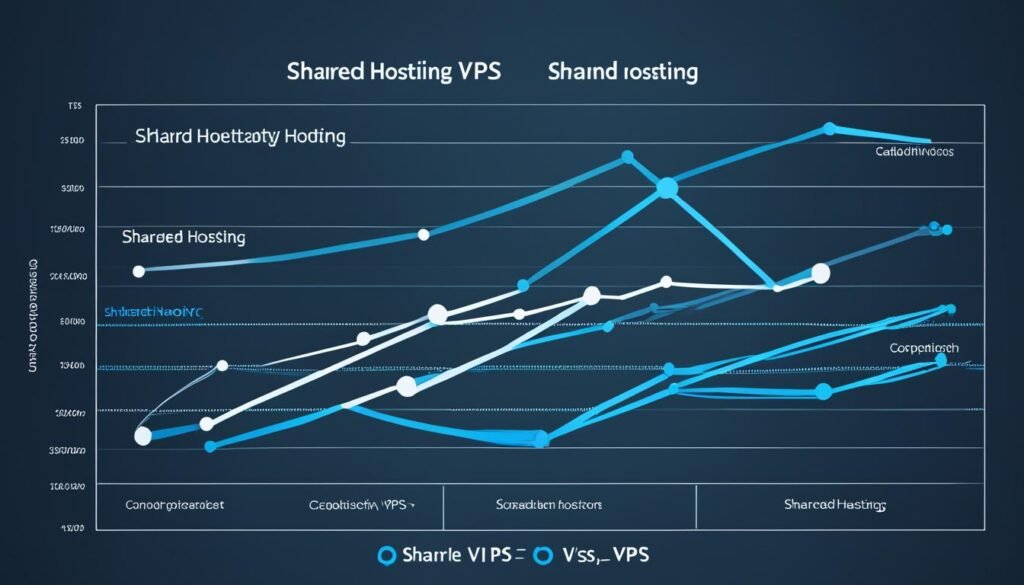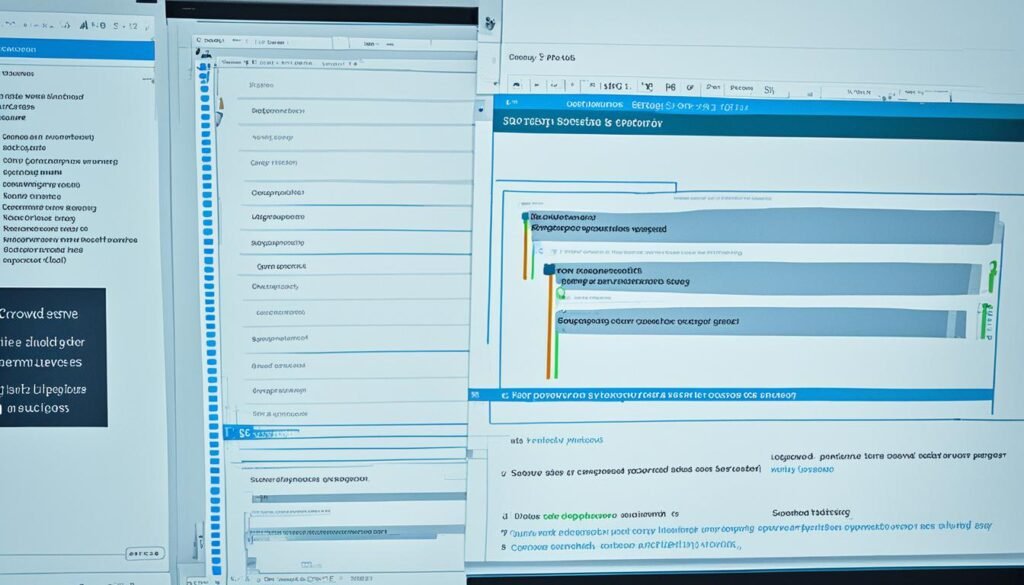When it comes to choosing a hosting solution for your website, two popular options that often come up are shared hosting and VPS hosting. Both have their own advantages and drawbacks, so it’s important to understand the difference between them to make an informed decision.
Shared hosting involves sharing server resources with other websites. This means that multiple websites are hosted on the same server, sharing the same resources such as CPU, RAM, and disk space. It is a more affordable option and is often preferred by beginners as it requires less technical expertise to set up and manage. Shared hosting typically comes with a standardized setup and is managed by the hosting provider, allowing you to focus on your website content and functionality.
VPS hosting, on the other hand, stands for Virtual Private Server hosting. It provides dedicated resources to each user, creating a virtual server environment within a physical server. With VPS hosting, you have more control and flexibility over your hosting environment. You have root access, which allows you to install your own operating system, control panel, and software. This is beneficial if you have specific customization requirements or if you need more resources to handle higher website traffic.
Key Takeaways
- Shared hosting involves sharing server resources with other websites, while VPS hosting provides dedicated resources to each user.
- Shared hosting is more affordable and beginner-friendly, while VPS hosting offers better performance and scalability.
- Consider your website’s needs, budget, and technical expertise when choosing between shared hosting and VPS hosting.
- Shared hosting is suitable for small websites or those with a limited budget, while VPS hosting is recommended for businesses or websites with higher traffic and scalability requirements.
- Make a smooth transition between hosting solutions by assessing factors such as increasing traffic, the need for more control and customization, and the potential for multiple websites or applications.
Shared Hosting Vs Vps Hosting: Pros and Cons
When considering web hosting options, it’s essential to weigh the pros and cons of shared hosting and VPS hosting. Each option has distinct advantages and limitations that can influence the overall performance and management of your website.
Shared Hosting Pros:
- **Cost-effective:** Shared hosting is generally more affordable than VPS hosting, making it an attractive option for individuals and small businesses with budget constraints.
- **Beginner-friendly:** Shared hosting typically comes with a standardized setup, making it easy for beginners to get started without much technical expertise or server management.
- **Managed hosting:** With shared hosting, the hosting provider takes care of server maintenance, updates, and security, reducing the burden of technical tasks on the website owner.
Shared Hosting Cons:
- **Limited resources:** In a shared hosting environment, server resources such as CPU, RAM, and bandwidth are shared among multiple websites, which can lead to performance issues if one site consumes excessive resources.
- **Impact of other websites:** The performance and security of your website can be affected by the activities of other websites hosted on the same server. If a neighboring site experiences high traffic or encounters security vulnerabilities, it may negatively impact your website.
- **Limited customization:** Shared hosting often provides limited customization options, restricting the ability to install specific software or modify server settings. Access to the root directory may also be restricted, limiting control over the hosting environment.
Understanding the pros and cons of shared hosting can help you make an informed decision based on your website’s needs and requirements.
Shared Hosting Vs Vps Hosting: Security Comparison

When choosing a hosting solution for your website, security is a crucial factor to consider. Both shared hosting and VPS hosting offer different levels of security, and understanding their differences can help you make an informed decision.
Shared Hosting Security
Shared hosting involves multiple websites sharing a single server. While this hosting option is cost-effective and suitable for small websites, it also means that the security of your website can be influenced by the other websites sharing the same server.
“With shared hosting, the performance and security of your website can be affected by high traffic or errors on the other websites hosted on the same server.”
Although hosting providers typically implement security measures to protect all shared hosting accounts, the actions of other users can indirectly impact your website’s security. If one of the websites sharing the server experiences a security breach, there is a potential risk of compromising the entire server and affecting all the websites hosted on it.
VPS Hosting Security
VPS (Virtual Private Server) hosting provides a higher level of security compared to shared hosting. With VPS hosting, each user is allocated their own partitioned server, which ensures that the actions of other users do not directly impact the security of your website.
“Having your own partitioned server significantly reduces the risk of security breaches caused by other users.”
However, it’s important to note that the security of a VPS hosting environment also relies on proper management. Users are responsible for implementing security measures, such as installing security patches, configuring firewalls, and regularly updating software, to ensure the security of their own server.
In summary, while shared hosting can be influenced by the security of other websites on the same server, VPS hosting provides better security by providing dedicated resources to each user. However, proper management and implementation of security measures are essential for maintaining the security of a VPS hosting environment.
Shared Hosting Vs Vps Hosting: Control and Customization

When it comes to control and customization, shared hosting and VPS hosting differ significantly. Shared hosting offers limited access to the server and often uses a standardized control panel, which can restrict your ability to customize your hosting environment.
In shared hosting, you typically have access to a control panel provided by the hosting company. While this control panel allows you to manage certain aspects of your website, it may have limitations in terms of customization options. You might not be able to install specific software or make changes to the server configuration to meet your unique requirements.
VPS hosting, on the other hand, provides you with root access, giving you complete control over your server. This means you can install your preferred operating system, control panel, and software. With root access, you have the freedom to customize your hosting environment based on your specific needs.
By having root access in VPS hosting, you can optimize your server’s performance, security, and resource allocation. This level of control allows you to install additional security measures, fine-tune server settings, and optimize software configurations. It is an ideal option if you require specific software or if you have advanced technical knowledge and want to tailor your hosting environment.
Having control over your hosting environment also means you can scale your resources as needed. Whether you require more disk space, bandwidth, or processing power, VPS hosting allows you to allocate and manage resources efficiently to ensure optimal website performance.
Overall, VPS hosting offers far greater control and flexibility in terms of customization options than shared hosting. It empowers you to tailor your hosting environment according to your specific needs, allowing you to optimize performance and enhance security. If customization and control are crucial factors for your website, VPS hosting is the recommended choice.
Comparison of Control and Customization in Shared Hosting and VPS Hosting:
| Hosting Solution | Control Panel | Customization Options |
|---|---|---|
| Shared Hosting | Standardized control panel provided by the hosting company | Limited customization options |
| VPS Hosting | Root access allows installation of preferred control panel | Extensive customization options |
As the table illustrates, shared hosting provides a standardized control panel with limited customization options. In contrast, VPS hosting offers root access, enabling the installation of a preferred control panel and allowing for extensive customization options.
Shared Hosting Vs Vps Hosting: Performance and Scalability

When it comes to hosting, performance and scalability are key factors to consider. Shared hosting and VPS hosting differ in their ability to handle high traffic and accommodate growing websites. Let’s explore the performance and scalability aspects of each hosting option.
Shared Hosting Performance
In shared hosting, multiple websites share the same server resources. This means that if a neighboring website experiences a sudden surge in traffic or consumes excessive resources, it can impact the performance of your website. High traffic or resource usage by other websites can lead to slower loading times and decreased overall performance.
Furthermore, shared hosting environments often have limitations on resources such as CPU usage, RAM, and bandwidth. These restrictions can further affect the performance of your website during peak traffic periods.
VPS Hosting Performance and Scalability
VPS hosting offers a more reliable performance compared to shared hosting. With VPS hosting, you are allocated dedicated resources such as CPU cores, RAM, and bandwidth. This ensures that your website’s performance remains consistent and unaffected by the activities of other websites.
Additionally, VPS hosting allows for easy scalability. As your website grows and requires more resources to handle increased traffic, you can easily upgrade your VPS plan to accommodate the higher demands. This scalability ensures that your website can continue to operate smoothly without any performance issues.
Comparative Performance and Scalability
To provide a clearer understanding of the differences between shared hosting and VPS hosting, let’s compare their performance and scalability side by side:
| Factors | Shared Hosting | VPS Hosting |
|---|---|---|
| Performance | Dependent on neighboring websites’ resource usage | Dedicated resources for consistent performance |
| Scalability | Limited scalability due to shared resources | Flexible scalability with easy resource upgrades |
Shared Hosting Vs Vps Hosting: Cost Comparison

When choosing a web hosting solution, cost is an important factor to consider. Shared hosting and VPS hosting differ in terms of pricing, and understanding the cost differences can help you make an informed decision.
Shared hosting is generally more affordable than VPS hosting. The costs of shared hosting are shared among multiple users, making it a cost-effective option for individuals and small businesses with limited budgets.
On the other hand, VPS hosting typically comes with a higher price tag. This is because VPS hosting offers more resources and features compared to shared hosting. With VPS hosting, you get dedicated resources and greater performance, which can justify the higher cost.
The actual cost of hosting varies depending on the specific hosting provider and the chosen plan. Different hosting providers offer different pricing structures, so it’s essential to compare plans and features before making a decision.
It’s important to consider your website’s needs and budget when choosing between shared hosting and VPS hosting. If you have a small website or limited budget, shared hosting may be the more cost-effective option. However, if you require greater performance, scalability, and customization options, the advantages of VPS hosting may outweigh the higher price.
To help you visualize the cost differences between shared hosting and VPS hosting, take a look at the following table:
| Hosting Type | Starting Price | Key Features |
|---|---|---|
| Shared Hosting | $5.99/month |
|
| VPS Hosting | $19.99/month |
|
As you can see, shared hosting generally has a lower starting price compared to VPS hosting. However, VPS hosting offers features like dedicated resources and root access, which may be worth the additional cost for users with specific needs and higher performance requirements.
Remember to assess your website’s current and future needs when considering the cost of hosting. A well-informed decision will ensure that you choose the right hosting solution that meets both your budget and requirements.
Key Takeaways:
- Shared hosting is generally more affordable than VPS hosting due to shared costs.
- VPS hosting offers more resources and features, justifying its higher price.
- Pricing varies depending on the hosting provider and chosen plan.
- Consider your website’s needs and budget when choosing between shared hosting and VPS hosting.
- Compare plans and features to make an informed decision.
Shared Hosting Vs Vps Hosting: Management and Technical Expertise

When it comes to the management of hosting services, shared hosting and VPS hosting differ in terms of technical expertise required.
Shared Hosting Management
Shared hosting is designed for users who want a hassle-free hosting solution without the need for advanced technical skills. With shared hosting, the hosting provider takes care of server maintenance, security, and technical tasks, allowing users to focus on their website content and business goals. This type of hosting is ideal for individuals or small businesses who prioritize simplicity and convenience over customizations and server management.
Shared hosting allows users to enjoy the benefits of a hosting solution without the management complexities. It’s like renting an apartment where the landlord takes care of maintenance and repairs while you focus on making your space your own.
VPS Hosting Management
VPS hosting, on the other hand, requires a higher level of technical expertise and involvement from the user. With VPS hosting, users have greater control and responsibility for managing their server environment. This includes tasks such as software installations, security configurations, and performance optimization.
Having more control over the server environment allows users to customize it according to their specific needs and preferences. However, it also means that users need to have the technical knowledge and skills to handle these management tasks effectively.
VPS hosting is like owning a home where you have the freedom to customize and make changes according to your preferences. However, you are also responsible for tasks like maintenance, upgrades, and ensuring security.
It’s important to consider your level of technical expertise when choosing between shared hosting and VPS hosting. If you are comfortable with handling server management tasks and desire more control over your hosting environment, VPS hosting might be the right choice for you. However, if you prefer a hands-off approach and want the hosting provider to handle most technical aspects, shared hosting is a suitable option. Ultimately, it comes down to your specific needs, goals, and comfort level with server management.
| Shared Hosting | VPS Hosting | |
|---|---|---|
| Management Complexity | Low | High |
| Technical Expertise Required | Minimal | Advanced |
| Server Maintenance | Handled by the hosting provider | User’s responsibility |
| Customization Options | Limited | Extensive |
Shared Hosting Vs Vps Hosting: Choosing the Right Hosting Plan

When it comes to selecting the ideal hosting plan for your website, it’s essential to consider your specific needs, budget, and technical expertise. Both shared hosting and VPS hosting offer distinct advantages depending on your requirements.
Shared hosting is a cost-effective option, making it suitable for small websites or individuals with a limited budget. With shared hosting, multiple websites share server resources, keeping costs low. However, the shared nature of this hosting solution means that resources, such as CPU, RAM, and bandwidth, are shared among all the websites on the server.
VPS hosting, on the other hand, provides dedicated resources to each user, offering better performance and scalability. It is a recommended choice for businesses or websites with higher traffic and resource-intensive requirements. VPS hosting partitions a physical server into multiple virtual servers, ensuring that each user gets their own set of resources.
When deciding between shared hosting and VPS hosting, it’s crucial to assess your website’s needs and future growth potential. If you anticipate significant growth in traffic or require more control over your hosting environment, VPS hosting is likely the better option. However, if you have a small website or are just starting out, shared hosting can be a cost-effective choice. Consider your budget and technical expertise as well, as VPS hosting may require more advanced management skills compared to the managed nature of shared hosting.
Here’s a summary to help you choose the right hosting plan:
- If you have a small website or limited budget, shared hosting is the more suitable choice.
- If you expect high traffic or need better performance and scalability, VPS hosting is recommended.
- Assess your technical expertise and consider whether you are comfortable with managing a VPS hosting environment.
- Consider your website’s future growth potential and whether the hosting plan can accommodate it.
Ultimately, the right hosting plan depends on your unique website needs, budget, and technical abilities. Take the time to carefully evaluate your options and choose the hosting plan that aligns with your goals and requirements.
Shared Hosting Vs Vps Hosting: Other Web Hosting Options

While shared hosting and VPS hosting are popular hosting solutions, there are other options available that may better suit your website’s needs. Let’s explore some of these alternative hosting options:
Cloud Hosting
One alternative to shared and VPS hosting is cloud hosting. With cloud hosting, your website is hosted across multiple servers, allowing for better resource allocation, load balancing, and increased uptime. This hosting option is ideal for websites that experience fluctuating traffic levels and require high availability.
Dedicated Hosting
If you require complete control and customization over your hosting environment, dedicated hosting is a great choice. With dedicated hosting, you have an entire server dedicated solely to your website. This option provides maximum performance, scalability, and security, but it comes at a higher cost compared to shared and VPS hosting.
Managed WordPress Hosting
If your website is built on WordPress, managed WordPress hosting is specifically tailored to enhance its performance and security. This hosting option offers optimized server configurations, automatic updates, and expert support for WordPress-related issues. Managed WordPress hosting is an excellent choice for those who want to focus on their website’s content and design without worrying about technical aspects.
Choose the hosting option that best aligns with your website’s requirements and goals.
Each hosting option has its own benefits and considerations, so it’s important to carefully evaluate your needs and budget before making a decision. Take into account factors such as performance, scalability, control, customization, and technical expertise required. By selecting the right hosting option, you can ensure a seamless and successful online presence for your website.
Shared Hosting Vs Vps Hosting: Upgrading and Transitioning

If you find yourself reaching the limits of shared hosting and require more resources and control over your hosting environment, it may be time to upgrade to VPS hosting. Transitioning from shared hosting to VPS hosting offers numerous benefits, such as increased performance, scalability, and customization options.
When deciding whether to upgrade to a VPS hosting plan, consider the following factors:
- Increasing Traffic: If your website is experiencing significant growth in traffic, shared hosting may no longer be sufficient to handle the increased load. VPS hosting provides dedicated resources that can better accommodate higher traffic volumes.
- Control and Customization: Shared hosting limits your ability to customize the server environment and may restrict certain administrative tasks. With VPS hosting, you gain full control and customization options, including the ability to install your preferred operating system, software, and control panel.
- Multiple Websites or Applications: If you plan to host multiple websites or applications on a single server, VPS hosting allows for better isolation and resource allocation. Each virtual server within a VPS hosting environment operates independently, ensuring that one website or application’s performance doesn’t impact others.
Planning and executing a smooth transition from shared hosting to VPS hosting is essential to minimize downtime and ensure uninterrupted service for your website. Here are some steps to follow:
- Evaluate Hosting Providers: Research and compare different VPS hosting providers to find the one that offers the resources, features, and pricing that align with your needs.
- Backup Your Data: Before transitioning, make sure to create backups of all your website’s data, including files, databases, and configurations.
- Set Up Your VPS: Once you’ve chosen a VPS hosting provider, follow their instructions to set up your virtual server. This typically involves selecting the desired specifications, operating system, and control panel.
- Migrate Your Website: Transfer your website files, databases, and configurations from the shared hosting server to your new VPS using established migration methods, such as FTP or cPanel.
- Test and Optimize: After the migration, thoroughly test your website on the VPS to ensure everything is functioning correctly. Optimize your server settings for performance and security.
- Update DNS Records: Update your domain’s DNS records to point to the new VPS hosting server, directing traffic to the new location.
- Monitor and Fine-Tune: Continuously monitor your website’s performance on the VPS and make any necessary adjustments or optimizations to further improve its stability and speed.
By carefully planning and executing the transition from shared hosting to VPS hosting, you can seamlessly upgrade your hosting solution without experiencing significant downtime or disruptions to your website’s availability.
| Shared Hosting | VPS Hosting |
|---|---|
| Shared server resources | Dedicated resources |
| Limited control and customization | Full control and customization options |
| Shared performance and scalability | Better performance and scalability |
| Affected by other websites on the server | Isolated environment |
| Lower cost | Higher cost |
Also Read: Understanding The Differences Between Shared And Vps Hosting
Conclusion
Shared hosting and VPS hosting are both viable options for hosting your website, each with its own set of advantages and considerations. If you have a small website or are just starting out, shared hosting can provide an affordable solution. It is beginner-friendly, with a standardized setup and managed services that require less technical expertise.
On the other hand, if you prioritize performance, scalability, and customization, VPS hosting may be the better choice. With dedicated resources and the ability to install your own software, you have more control over your hosting environment. VPS hosting also offers better security, as each user has their own server partition.
When deciding between shared hosting and VPS hosting, consider your specific needs, budget, and technical expertise. Evaluate factors like website traffic, growth potential, and the level of control and customization that aligns with your goals. Choosing the right hosting solution, whether it’s shared hosting or VPS hosting, will ensure your website’s success in the online world.
FAQs
Q: What is the difference between shared hosting and VPS hosting?
A: Shared hosting is when multiple websites are hosted on a single server and share its resources, while VPS hosting involves dividing a physical server into multiple virtual servers that operate independently.
Q: How do shared and VPS hosting differ in terms of server resources?
A: In shared hosting, resources like CPU, RAM, and storage are shared among multiple websites, whereas in VPS hosting, each virtual server has dedicated resources allocated to it.
Q: What are the advantages of VPS hosting over shared hosting?
A: VPS hosting offers more control, flexibility, and scalability compared to shared hosting. Additionally, VPS hosting provides better security and performance for websites with higher traffic levels.
Q: When should I choose shared hosting over VPS hosting?
A: Shared hosting is a cost-effective solution suitable for small websites, blogs, or businesses with low to moderate traffic. It is ideal for those who require basic hosting services without the need for extensive resources or customization.
Q: What is the best hosting type for my website – shared or VPS?
A: The choice between shared hosting and VPS hosting depends on your website’s specific needs. If you anticipate growth in traffic, require more control over server settings, and prioritize performance and security, VPS hosting may be the better option for you.
Q: How do I decide between shared hosting and VPS hosting providers?
A: Consider factors such as pricing, service quality, reliability, customer support, and the specific features offered by each provider when choosing between shared hosting and VPS hosting providers.
Q: What are the key differences between shared and VPS hosting plans?
A: Shared hosting plans start at a lower price point and are suitable for smaller websites, whereas VPS hosting plans offer more advanced features, customization options, and dedicated server resources for websites that require a higher level of performance and control.




